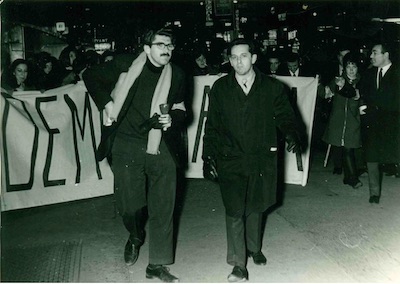Dan Georgakas: Radical Thunderbolt
by Kostis Karpozilos
I logged-in to an email account I haven’t used for years, and I found it. Twenty years ago, in 2002, I was a graduate student in Thessaloniki and had just discovered some issues of Empros, the newspaper that Greek American communists published in the 1930s. My knowledge on the American Left was extremely limited, but I was curious to know more. It was a bizarre moment; the United States had just launched the War on Terror and the radical world that I had been active was staunchly anti-American. Looking back, I think my initial interest in Empros reflected an unconscious effort to challenge my own certainties. Encouraged by Yiorgos Kalogeras, I sent an email to Dan Georgakas. Contrary to Greek academic standards—where often hierarchies translate into arrogance—he responded enthusiastically. He encouraged me to look into the subject further; something I did for the years to come.
Dan was full of passion and energy, and I owe him a lot. Since our first meeting in 2003 in Thessaloniki (when he was an invited speaker at the International Film Festival) we kept in touch and when I started visiting the United States we met on several occasions. He introduced me to people (as in the case of the warm atmosphere surrounding the Journal of the Hellenic Diaspora), he helped me trace sources (a friend of his was carrying a 1930s archive in the trunk of his cab), we sat on panels at radical fora (with Eric Poulos at the Brecht Forum), we discussed and debated over food and sodas. Dan was unique. And what made him unique in my eyes was how he embodied diverse radical traditions in a hybrid political identity that escaped and challenged simplistic classifications. Dan was politicized in a time that the old ethnic Left was in a terminal crisis under the impact of the Cold War. His own path into radical politics had nothing to do with this tradition. He engaged in a novel and dynamic landscape that combined working-class direct action, cultural experimentation, and dynamic forms of protest.

This, I think, was the world of Dan up to 1967. The Greek military dictatorship proved a pivotal moment. Greece was becoming a global point of interest for the New Left as it exemplified the consequences of Cold War reasoning, it provided room for historical analogies around the concept of “Democracy,” and an attractive case-study for opposing imperialism and colonialism. For Dan, the fight against the Greek junta became the entry point of reframing his Greekness. He came into contact with a world that had few things in common with the American New Left: the legacy of the 1940s, the fantasy of the eternally resisting nation vs. its oppressors, the traumatic history of a Left that had fought, bearing arms, and lost a decisive battle. Dan Georgakas was one of the very few who could bring these two worlds in dialogue. His frenetic activity (from a hunger strike and militant protests to translations, fundraisers and organizing committees) reflects an almost unique flexibility that produced a fascinating trail.
When I met Dan, for my generation the junta was a distant past. Important in our political commitments, but not decisive. I was impressed by the impact it had on him. To be more precise, I was often puzzled by how deeply involved he was in Greek “national questions” employing a clear-cut dichotomy between Greece and Turkey. I think the origins of this outlook have to be traced to the impact of the traumatic events of 1974 when the Turkish invasion of Cyprus led to the downfall of the junta. This event became the springboard for his later works on Greek-Turkish relations and his involvement in endeavors such as the American Journal of Contemporary Hellenic Issues. Leaving other issues aside, the choice of embracing and defending the dominant national narrative on foreign affairs, allowed Dan to promote, strategically, the integration of the—up to that point—marginalized social history of Greek Americans in the institutionalized Greek American world. It is a strategy with which I disagree, but I respect it.
I will always remember Dan with his fist raised saying “the proletarian thunderbolt” while giving life to some story from the 1930s. His fist was raised in the manner of someone who has done this before in his life; Dan was a fighter, an activist, a man with a clenched fist against oppression and inequality. At the same time, while raising his fist he was smiling. Not in an ironic manner. Quite the contrary. His work was devoted to the preservation of the voices of those who did not have a voice, to the invisible working-class stories that shaped the United States, to the lost world of radicals and revolutionaries. His smile reflected sensitivity; for the contradictions of our individual and collective efforts, for the disillusionment that comes hand-in-hand with emancipation, for the limitations of even the most unique human thunderbolts among us.
Kostis Karpozilos
is a historian and the director of the Contemporary Social History Archives
(ASKI). He is the scriptwriter of the documentary
Greek American Radicals: The Untold Story
(2013), the author of
Red America: Greek Immigrants and the Quest for a New World, 1900-1950
(Crete University Press,2017; forthcoming in English, Berghahn Books) and
co-author (with Dimitris Christopoulos) of a book on the Macedonian
Question (10+1 Questions and Answers on the Macedonian Question,
Rosa Luxemburg Stiftung, 2018). Currently he is working on a transnational
history of the Greek communist movement.
